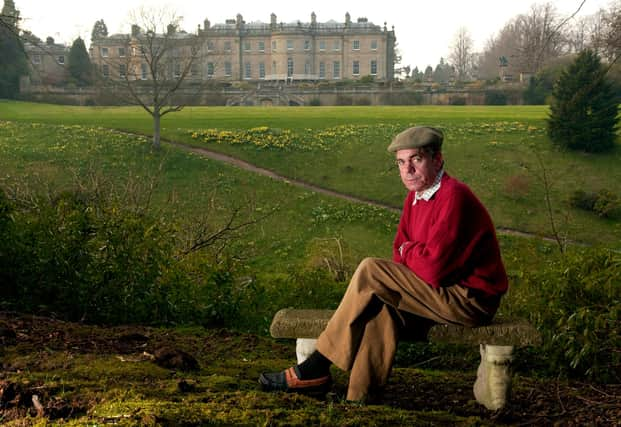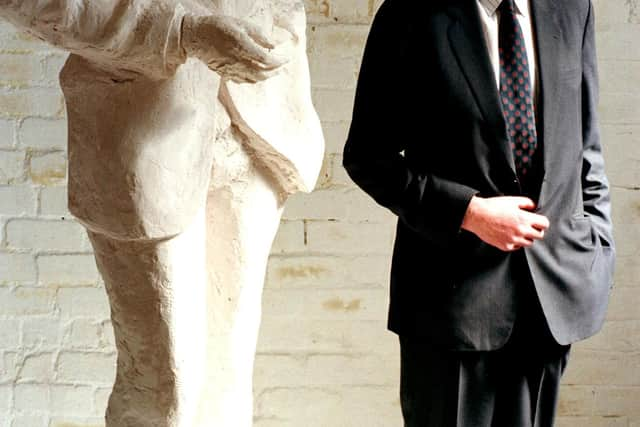Revealed: Peers across Scotland paid nearly £3m in EU subsidies since Brexit vote


Peers across Scotland and their families have received nearly £3 million in European agricultural subsidies since the year of the Brexit referendum.
The eight serving members of the House of Lords, whose landholdings span tens of thousands of acres across Scotland, benefited from the subsidies via the EU’s Common Agricultural Policy (CAP) scheme.
Advertisement
Hide AdAdvertisement
Hide AdThe analysis has sparked renewed calls for the abolition of the second chamber of the UK Parliament.


Scottish Labour said the trend demonstrated the need for a fairer and more transparent financial support system designed to better help small farmers instead of wealthy peers.
The payments, made between 2016 and 2019, went to companies and estates the Lords members either own outright or have shareholdings or partnerships in. Some were made to their relatives and fellow company directors. Tory peers account for nearly two thirds of the subsidy total.
It comes as it was revealed how Tory ministers, MSPs, councillors and their firms received close to £3m through the same subsidy scheme, set up as a “safety net” for farmers and crofters.


The analysis, part of a series of stories into CAP payments, show the biggest recipient of CAP funds at the Lords was the son of the Duke of Montrose, a Tory hereditary peer and former Scotland Office shadow minister.
Payment databases maintained by the UK Department for Environment, Food, and Rural Affairs (DEFRA) reveal £546,072 was paid between 2016 and 2019 to Lord James A N Graham, the duke’s eldest son, better known as the Marquess of Graham.
Companies House records show both father and son are directors of a firm called Montrose Estates (1993) Limited, registered in St Helier in the Channel Island of Jersey, and which has a UK establishment of the same name, registered at Buchanan Castle golf club, by Drymen near Loch Lomond. The 85-year-old duke signed off on the latest accounts, which show the company has assets worth £3.2m.
The Duke of Montrose said his son had taken over the agricultural business he had actively farmed for 50 years, and said the CAP payments supported its labour and expenses, while helping provide employment and housing for several families.
Advertisement
Hide AdAdvertisement
Hide AdHe explained that Montrose Estates (1993) Limited, while registered in Jersey, was resident and trading “entirely in the UK”, adding: “As such, Montrose Estates (1993) Ltd pays corporation tax on all its profits and gains just like any other UK limited company.”
The second biggest tranche of subsidies were paid to a firm controlled by the Earl of Home, David Douglas-Home, a Tory hereditary peer.
Some £490,937 was paid to the Douglas & Angus Estates firm over the same period. He is listed as a person with “significant control” of the entity, Companies House records show, and one of its single largest shareholders.
The company manages a landholding primarily found in Coldstream and South Lanarkshire. The size of the estate extends to around 36,000 acres, according to its website.
The peer, the only son of former Conservative prime minister Alec-Douglas-Home, is a former chairman of Coutts bank. The 77-year-old has spoken just once in the Lords since December 2017, addressing a debate on tree diseases.
Henry Birch, an agent for the Douglas & Angus Estates, said the CAP payments were “for the benefit of the company, not Lord Home”, and “are in common with those received by every other farmer and farming business in Scotland”.
Elsewhere, a company controlled by Alexander Henry Scrymgeour, the Earl of Dundee, received £349,080 in CAP payments over the same period.
The 71-year-old is listed as a person with “significant control” over Dundee Farming Company Limited, based at Birkhall estate in Cupar, Fife.
Advertisement
Hide AdAdvertisement
Hide AdThe company manages around 2,000 acres of land across Dundee and Angus. The Eton-educated peer is one of two shareholders in the firm, the other being a discretionary trust.
In the East Neuk of Fife, £229,455 went to Kilconquhar Farms. The Kilconquhar Estate is owned by 65-year-old James Lindesay-Bethune, the Earl of Lindsay, and a former parliamentary under-secretary of state for Scotland under John Major’s government.
Its website states that Kilconquhar is a mixed farm with wheat, barley, and oats, as well as grassland for rearing sheep and cattle.
Lord Lindsay said: “I confirm that I have disclosed my farming and other interests in accordance with the requirements of the House of Lords’ code and have no further comment to add.”
Lovat Highland Estates Ltd, a firm over which Lord Reay, another hereditary Tory peer, exercises “significant control”, according to Companies House records, received £110,661.
The 55-year-old is a corporate financier, and a founding partner of Montrose Partners. The Lovat estate spans around 670 acres near Beauly.
Elsewhere, £83,461 was paid to an entity called Lothian Estates Woodlands. Lothian Estates, a sprawling Jedburgh landholding home to rental properties, holiday homes, and nearly 2,500 acres of forestry, counts the Marquess of Lothian among its directors and shareholders.
Better known as Michael Ancram, the 75-year-old Conservative life peer is a former MP, Northern Ireland minister, and chairman of the Conservative party. He is listed as having “significant control” of Lothian Estates in Companies House filings.
Advertisement
Hide AdAdvertisement
Hide AdIt is not only Conservative peers who have enjoyed significant EU subsidies in recent years. The bill to taxpayers is even higher when crossbench peers are taken into account.
The grand estate of Lord Palmer, a crossbench peer and a former Scottish representative to the European Landowners' Organisation, is another recipient of significant CAP payments.
Some £426,806 was paid to Manderston Farms, based at his estate of the same name in Duns in the Scottish Borders.
The estate, set amongst 56 acres of formal gardens, is the home of the 69-year-old, whose family made their fortune selling biscuits.
Manderston’s centrepiece is a grand 109-room country house bedecked with Italian crystal chandeliers and 19th-century Meissen porcelain. Built in 1905, it is billed the only property in the world with a silver-plated staircase.
Lord Palmer said he mainly grew malting barley at Manderston, employing three staff, but that prices had remained largely unchanged over the past quarter century.
“Farming wouldn’t exist without these subsidies from the EU, and nobody knows quite what is going to happen come January 1, which is concerning,” he said.
John Dalrymple, the Earl of Stair, is listed by Companies House as a person with “significant control” over Balker Farms Limited, a Dumfries-based mixed farming company which received £606,836.
Advertisement
Hide AdAdvertisement
Hide AdThe most annual returns for Balker Farms, posted in 2016, show 99.9 per cent of its ordinary shareholdings were held by a firm called Federal Trust Co Ltd, based in the Channel Island of Guernsey.
Federal Trust ceased being classed as a person or entity with “significant control” in 2018.
On his register of interests at the Lords, the 59-year-old crossbench peer, states he has shareholdings in Balker Farms among a host of other companies, including the drinks giant, Diageo. He declined to comment.
A spokesman for the SNP said: “It was not long ago the Lords were outraged that their daily allowance was being cut from £323 to £162 a day, but that is a drop in the ocean when compared to the hundreds of thousands of pounds of EU funding they continue to line their pockets with.
"This is another demonstration of the abomination of the Lords, which has well past its sell-by date and should be abolished."
Colin Smyth, Scottish Labour’s rural economy spokesman, said: “It really does highlight the need for the Scottish Government to stop dithering over what replaces CAP post-Brexit and sets out a fairer, more transparent system of support that better backs small farmers and makes agriculture and our rural communities more sustainable.
“In the meantime, given the focus on this issue, politicians whether elected or not, could start by being more transparent and fully declaring these payments, even if the rules don’t demand they do.”
Mark Ruskell, the Scottish Greens farming spokesman, said: “The burdens of economic pressures and climate breakdown have fallen particularly heavily on small farmers and crofters, who do not have cash flow to cope with such a difficult period.”
Advertisement
Hide AdAdvertisement
Hide AdHe added: “Farming subsidy needs to target sustainable improvements in agriculture to tackle the rapid loss of nature and climate breakdown, not line the pockets of Tory politicians.”
The Marquess of Lothian, the Earl of Dundee, and Lord Reay did not respond to requests for comment.
A message from the editor:Thank you for reading this article. We're more reliant on your support than ever as the shift in consumer habits brought about by coronavirus impacts our advertisers. If you haven't already, please consider supporting our trusted, fact-checked journalism by taking out a digital subscription.
Comments
Want to join the conversation? Please or to comment on this article.